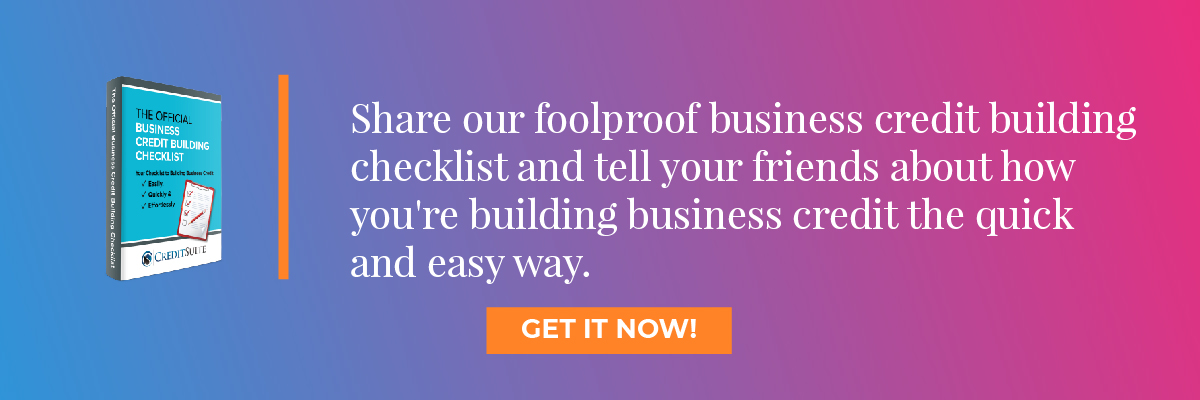- Connect With Us!
- (877) 600-2487
- info@creditsuite.com
Building Corporate Credit Like a Boss – Get the Secrets Here!
Published By Janet Gershen-Siegel at February 9th, 2018
You Asked: How Can I Start Building Corporate Credit Like a Boss?
The secret is out: anyone can start building corporate credit like a boss!
Is building corporate credit fast or slow? Building company credit means that your business gets chances you never felt that you would. You can get new equipment, bid on real estate, and cover the company payroll. And you can even when times are a bit lean. This is especially helpful in seasonal business enterprises, where you can go for calendar months with simply low sales.
As a result of this, you need to work on growing your corporate credit. Improve and maintain your scores and you will have these chances. Do not, and either you do not get these chances, or they will cost you a lot more. And no small business owner wants that. You have to know what affects your corporate credit before you can make it better.
Building Corporate Credit Like a Boss: Every Company Needs Corporate Credit Establishing
Corporate credit is credit in a small business’s name. It doesn’t attach to an entrepreneur’s personal credit, not even when the owner is a sole proprietor and the sole employee of the company.
Accordingly, a business owner’s business and consumer credit scores can be very different.
The Advantages
Given that company credit is distinct from personal, it helps to secure a business owner’s personal assets, in the event of court action or business insolvency.
Also, with two separate credit scores, an entrepreneur can get two different cards from the same merchant. This effectively doubles purchasing power.
Another benefit is that even start-ups can do this. Heading to a bank for a business loan can be a formula for frustration. But building corporate credit, when done the right way, is a plan for success.
Individual credit scores are dependent on payments but also additional factors like credit usage percentages.
But for corporate credit, the scores really merely hinge on whether a small business pays its bills on a timely basis.
Learn more here and get started toward growing corporate credit.
Building Corporate Credit Like a Boss: Credit History Length Matters
This is how long your company has been working with company credit. Newer businesses will have very short credit histories. While there is not too much you can specifically do about that, do not panic. Credit reporting bureaus will also assess your personal credit score and your own record of payments.
If your personal credit is excellent, and in particular if you have a reasonably extensive credit history, then personal credit can come to the rescue of business.
Normally the opposite is also true. If your individual credit history is bad, then it will impact your company credit scores until your company and individual credit can be separated.
Building Corporate Credit Like a Boss: Your Payment History is Important
Late monthly payments will influence your company credit score for a good seven years. If you pay your business (and personal) financial obligations off, as rapidly as possible and as fully as possible, then you can make a very real difference when it concerns your credit scores. Ensure to pay on time and you will reap the rewards of punctuality.
Building Corporate Credit Like a Boss: The Process
Building corporate credit is a process, and it does not occur without effort. A business has to proactively work to build corporate credit.
Nevertheless, it can be done easily and quickly, and it is much more efficient than building consumer credit scores.
Merchants are a big aspect of this process.
Carrying out the steps out of sequence will cause repetitive rejections. Nobody can start at the top with corporate credit. For instance, you can’t start with retail or cash credit from your bank. If you do, you’ll get a rejection 100% of the time.
Company Fundability
A business must be fundable to lending institutions and vendors.
For this reason, a company will need a professional-looking website and e-mail address. And it needs to have site hosting from a company like GoDaddy.
In addition, company telephone and fax numbers ought to have a listing on ListYourself.net.
Likewise, the company phone number should be toll-free (800 exchange or similar).
A company will also need a bank account devoted only to it, and it has to have every one of the licenses essential for running.
Licenses
These licenses all have to be in the particular, appropriate name of the business. And they need to have the same business address and telephone numbers.
So bear in mind, that this means not just state licenses, but possibly also city licenses.
Learn more here and get started toward growing corporate credit.
Working with the IRS
Visit the IRS website and get an EIN for the small business. They’re free. Pick a business entity like corporation, LLC, etc.
A company can begin as a sole proprietor. But they will most likely wish to switch to a type of corporation or an LLC.
This is in order to lessen risk. And it will make the most of tax benefits.
A business entity will matter when it involves tax obligations and liability in case of a lawsuit. A sole proprietorship means the business owner is it when it comes to liability and taxes. Nobody else is responsible.
Sole Proprietors Take Note
If you operate a company as a sole proprietor, then at least be sure to file for a DBA. This is ‘doing business as’ status.
If you do not, then your personal name is the same as the company name. Consequently, you can wind up being personally responsible for all small business debts.
In addition, per the Internal Revenue Service, by having this structure there is a 1 in 7 chance of an IRS audit. There is a 1 in 50 chance for corporations! Prevent confusion and considerably reduce the chances of an IRS audit at the same time.
Starting Off the Corporate Credit Reporting Process
Start at the D&B website and obtain a cost-free D-U-N-S number. A D-U-N-S number is how D&B gets a business in their system, to generate a PAYDEX score. If there is no D-U-N-S number, then there is no record and no PAYDEX score.
Once in D&B’s system, search Equifax and Experian’s websites for the company. You can do this at fastcs.wpengine.com/reports. If there is a record with them, check it for correctness and completeness. If there are no records with them, go to the next step in the process.
In this way, Experian and Equifax will have activity to report on.
Vendor Credit Tier
First you must establish trade lines that report. This is also referred to as the vendor credit tier. Then you’ll have an established credit profile, and you’ll get a corporate credit score.
And with an established corporate credit profile and score you can begin to obtain credit in the retail and cash credit tiers.
These kinds of accounts tend to be for the things bought all the time, like marketing materials, shipping boxes, outdoor work wear, ink and toner, and office furniture.
But first off, what is trade credit? These trade lines are credit issuers who will give you initial credit when you have none now. Terms are normally Net 30, versus revolving.
So, if you get approval for $1,000 in vendor credit and use all of it, you must pay that money back in a set term, like within 30 days on a Net 30 account.
Details
 Net 30 accounts have to be paid in full within 30 days. 60 accounts have to be paid fully within 60 days. In comparison with revolving accounts, you have a set time when you must pay back what you borrowed or the credit you made use of.
Net 30 accounts have to be paid in full within 30 days. 60 accounts have to be paid fully within 60 days. In comparison with revolving accounts, you have a set time when you must pay back what you borrowed or the credit you made use of.
To begin your corporate credit profile the right way, you ought to get approval for vendor accounts that report to the business credit reporting bureaus. As soon as that’s done, you can then use the credit.
Then repay what you used, and the account is on report to Dun & Bradstreet, Experian, or Equifax.
Vendor Credit Tier – It Makes Sense
Not every vendor can help like true starter credit can. These are vendors that will grant an approval with very little effort. You also want them to be reporting to one or more of the big three CRAs: Dun & Bradstreet, Equifax, and Experian.
You want 5 to 8 of these to move onto the next step, which is the retail credit tier. But you may need to apply more than once to these vendors. So, this is to confirm you are dependable and will pay in a timely manner.
Uline Shipping Supplies
Uline Shipping Supplies is a true starter vendor. You can find them online at www.uline.com. They offer shipping, packing, and industrial supplies, and they report to D&B.
You need to have a D-U-N-S number. They will ask for 2 references and a bank reference. The initial few orders may need to be paid in advance to initially get approval for Net 30 terms.
Quill
Quill is another true starter vendor. You can find them online at www.quill.com. They sell office, packaging, and cleaning supplies, and they report to D&B and Experian.
Since Quill reports to two separate credit reporting agencies, you get two credit experiences with them. Place an initial order first unless the D&B score is established.
Frequently they will put you on a 90-day prepayment schedule. If you order items every month for 3 months, they will commonly approve you for a Net 30 Account.
Grainger Industrial Supply
Grainger Industrial Supply is also a true starter vendor. You can find them online at www.grainger.com. They sell safety equipment, plumbing supplies, and more, and they report to D&B. You will need to have a business license, EIN, and a D-U-N-S number.
For less than a $1000 credit limit they will approve nearly anyone with a business license.
Accounts That Do Not Report
Non-Reporting Trade Accounts can also be helpful. While you do want trade accounts to report to at the very least one of the CRAs, a trade account which does not report can nevertheless be of some value.
You can always ask non-reporting accounts for trade references. Also credit accounts of any sort should help you to better even out business expenditures, thus making financial planning less complicated. These are providers like PayPal Credit, T-Mobile, and Best Buy.
Retail Credit Tier
Once there are 5 to 8 or more vendor trade accounts reporting to at least one of the CRAs, then move to the retail credit tier. These are companies such as Office Depot and Staples.
Just use your Social Security Number and date of birth on these applications for verification purposes. For credit checks and guarantees, use the business’s EIN on these credit applications.
One good example is Lowe’s. They report to D&B, Equifax and Business Experian. They want to see a D-U-N-S and a PAYDEX score of 78 or more.
Fleet Credit Tier
Are there 8 to 10 accounts reporting? Then move to the fleet credit tier. These are businesses such as BP and Conoco. Use this credit to buy fuel, and to fix, and maintain vehicles. Only use your Social Security Number and date of birth on these applications for verification purposes. For credit checks and guarantees, make certain to apply using the business’s EIN.
One such example is Shell. They report to D&B and Business Experian. They want to see a PAYDEX Score of 78 or higher and a 411 company telephone listing.
Shell might say they want a particular amount of time in business or revenue. But if you already have adequate vendor accounts, that won’t be necessary. And you can still get approval.
Learn more here and get started toward growing corporate credit.
Cash Credit Tier
Have you been sensibly managing the credit you’ve up to this point? Then move onto the cash credit tier. These are service providers such as Visa and MasterCard. Only use your SSN and date of birth on these applications for verification purposes. For credit checks and guarantees, use your EIN instead.
One such example is the Fuelman MasterCard. They report to D&B and Equifax Business. They want to see a PAYDEX Score of 78 or higher. And they also want you to have 10 trade lines reporting on your D&B report.
Plus, they want to see a $10,000 high credit limit reporting on your D&B report (other account reporting).
In addition, they want you to have an established small business.
These are companies like Walmart and Dell, and also Home Depot, BP, and Racetrac. These are frequently MasterCard credit cards. If you have 14 trade accounts reporting, then these are feasible.
Building Corporate Credit Like a Boss: Monitor Your Corporate Credit
Know what is happening with your credit. Make certain it is being reported and fix any inaccuracies ASAP. Get in the habit of taking a look at credit reports and digging into the details, and not just the scores.
We can help you monitor corporate credit at Experian and D&B for 90% less than it would cost you at the CRAs. See: fastcs.wpengine.com/monitoring.
At D&B you can monitor at: www.dandb.com/credit-builder. At Experian, you can monitor your account at: www.smartbusinessreports.com/Landing/1217/. And at Equifax, you can monitor your account at: www.equifax.com/business/business-credit-monitor-small-business. Experian and Equifax cost about $19.99; D&B ranges from $49.99 to $99.99.
Update Your Records
Update the details if there are mistakes or the information is incomplete. At D&B, you can do this at: https://iupdate.dnb.com/iUpdate/viewiUpdateHome.htm. For Experian, go here: www.experian.com/small-business/business-credit-information.jsp. And for Equifax, go here: www.equifax.com/business/small-business.
Building Corporate Credit Like a Boss: Fix Your Corporate Credit
So, what’s all this monitoring for? It’s to challenge any problems in your records. Mistakes in your credit report(s) can be fixed. But the CRAs typically want you to dispute in a particular way.
Get your business’s PAYDEX report at: www.dnb.com/about-us/our-data.html. Get your company’s Experian report at: www.businesscreditfacts.com/pdp.aspx?pg=SearchForm. And get your Equifax corporate credit report at: www.equifax.com/business/credit-information.
Disputes
Disputing credit report inaccuracies typically means you send a paper letter with duplicates of any proof of payment with it. These are documents like receipts and cancelled checks. Never mail the originals. Always send copies and retain the original copies.
Fixing credit report mistakes also means you specifically detail any charges you contest. Make your dispute letter as clear as possible. Be specific about the concerns with your report. Use certified mail so that you will have proof that you sent in your dispute.
Dispute your or your small business’s Equifax report by following the instructions here: www.equifax.com/small-business-faqs/#Dispute-FAQs.
You can dispute errors on your or your business’s Experian report by following the directions here: www.experian.com/small-business/business-credit-information.jsp.
And D&B’s PAYDEX Customer Service contact number is here: www.dandb.com/glossary/paydex.
Building Corporate Credit Like a Boss: A Word about Corporate Credit Building
Always use credit responsibly! Don’t borrow beyond what you can pay off. Track balances and deadlines for payments. Paying off in a timely manner and completely will do more to increase corporate credit scores than almost anything else.
Establishing corporate credit pays. Good corporate credit scores help a company get loans. Your lending institution knows the company can pay its financial obligations. They understand the small business is for real.
The business’s EIN connects to high scores and lenders won’t feel the need to request a personal guarantee.
Building Corporate Credit Like a Boss: Takeaways
Corporate credit is an asset which can help your business in years to come.

 " class="attachment-blog-single size-blog-single wp-post-image" alt="Get Business Credit Cards for New Businesses Credit Suite-Business Line of Credit Decoded" title="Get Business Credit Cards for New Businesses">>
" class="attachment-blog-single size-blog-single wp-post-image" alt="Get Business Credit Cards for New Businesses Credit Suite-Business Line of Credit Decoded" title="Get Business Credit Cards for New Businesses">>
1 Comment
Love this!!